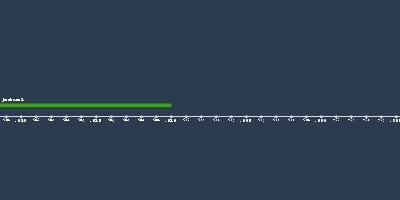Hyrcanus II (nov 1, 67 BC – jan 30, 66 BC)
Description:
John Hyrcanus II (died 30 BCE), a member of the Hasmonean dynasty, was for a long time the Jewish High Priest in the 1st century BCE.He was also briefly King of Judea 67–66 BCE and then the ethnarch (ruler) of Judea, probably over the period 47–40 BCE.
Hyrcanus was the eldest son of Alexander Jannaeus, King and High Priest, and Alexandra Salome.
After the death of Alexander in 76 BCE, his widow succeeded to the rule of Judea and installed her elder son Hyrcanus as High Priest. Alexander had numerous conflicts with the Pharisees.
However Hyrcanus was supported by the Pharisees, especially later in his tenure.
When Salome died in 67 BCE, she named Hyrcanus as her successor as ruler of Judea as well, but soon he and his younger brother, Aristobulus II, dissented over the right to the throne.
Hyrcanus had scarcely reigned three months when Aristobulus II rose in rebellion. Hyrcanus advanced against him at the head of his mercenaries and his followers. The brothers met in a battle near Jericho with many of Hyrcanus' soldiers going over to Aristobulus II, and thereby gave the latter the victory.
Hyrcanus took refuge in the citadel of Jerusalem; but the capture of the Temple by Aristobulus II compelled Hyrcanus to surrender. A peace was then concluded in which Hyrcanus was to renounce the throne and the office of high priest, but was to enjoy the revenues of the latter office.
During the Roman civil war, the Roman general Pompey defeated armies of the kingdoms of Pontus and the Seleucids. He sent his deputy Marcus Aemilius Scaurus to take possession of Seleucid Syria.
As the Hasmoneans were allies of the Romans, both brothers appealed to Scaurus, each endeavouring through gifts and promises to win him over to his side. Scaurus, moved by a gift of 400 talents, decided in favour of Aristobulus and ordered Aretas to withdraw his army. During his retreat, the Nabateans suffered a crushing defeat at the hands of Aristobulus. Scaurus returned to Damascus.
When Pompey arrived in Syria in 63 BCE, both brothers and a third party that desired the removal of the entire dynasty (according to some sources, these may have been the representatives of the Pharisees), sent their delegates to Pompey, who delayed making a decision. He favoured Hyrcanus over Aristobulus, deeming the elder, weaker brother a more reliable ally of the Roman Empire.
Aristobulus, suspicious of Pompey's intentions, entrenched himself in the fortress of Alexandrium, but when the Roman army approached Judea, he surrendered and undertook to deliver Jerusalem over to them. However, since many of his followers were unwilling to open the gates, the Romans besieged and captured the city by force, badly damaging city and the temple. Aristobulus was taken to Rome a prisoner and Hyrcanus restored as high priest in Jerusalem.
Added to timeline:
Date:
nov 1, 67 BC
jan 30, 66 BC
~ 1 years and 9 months
